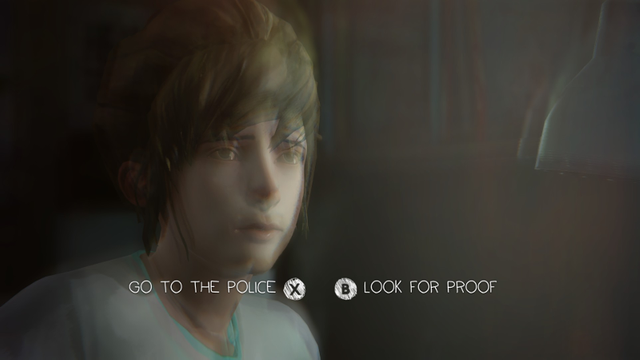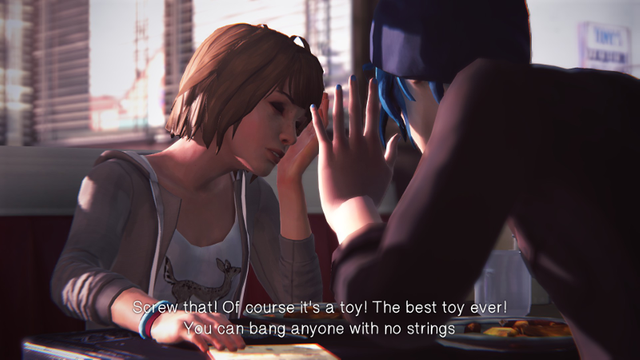Episode 2 of Life is Strange is brutal. Especially when the climax puts your choices, memory, and judgment to the test in a desperate intervention to save a life--and you fail. Moreover, at the end of each episode, the game informs you how common your choices and outcomes were, among your friends and in the player base at large. It turns out that, of the pool of people consisting of my Steam friends list and myself, I was the only one who failed that particular test. Harsh.

I saw the way this was headed, but was unable to prevent it. This game does not fuck around with its choice of topics.
That's still pretty raw. So instead of waxing bloggish about the specifics of the episode's plot, I'm going to situate it in the canon of "games that mess with the concept of 'saving' and 'loading'." Spoilers ahead for Undertale and the interactive fiction 'Slouching Towards Bedlam'.
Ever since video games grew beyond ad hoc, ephemeral single play sessions (think Pong) to experiences that unfolded over many hours, the function of "saving" one's game state to return to later has been a necessity. As design thought and technology advanced, game mechanics evolved to integrate that basic, system-level function into the flow of the game itself. Dungeon delve RPGs used "save points" to create a cycle of tension and relief. Genre-defining survival horror game Resident Evil limited how often you could save as well as where, playing up its theme of shepherding scant resources. First-person shooters introduced a "quick save" so that no one shootout, jump, or trap need set you back more than a few moments' progress. And so on.
With save/load mechanics so ubiquitous and varied, they were ripe for deconstruction.

See, Chloe knows what I was talking about re the Imp of the Perverse! She'd say the same thing about saving and loading.
The 2003 interactive fiction "Slouching Towards Bedlam" was my first encounter with save/load deconstruction. In it, the ability to make snapshots of one's life and jump around to them at will was a side effect of infection by a sort of alien virus. Said virus also induced common video game, and IF in particular, behaviors: obsessive inspection of environmental objects, kleptomaniacal pocketing of portable items, etc. Bringing save/load from the metagame layer down to the narrative supported the game's overall thematic project of highlighting how bizarre the ludic mindset can be.
Undertale took a further step in that it not only made save/load a power that existed in the setting of the game, but subverted the player's expectations on how such things work. Reloading a save file did not pristinely reset the game state. Some characters retain vague, déjà vu-like impressions of the player's previous interactions with them, reacting with apprehension if the player killed them on a previous play, for example. One character in particular, the villainous flower Flowey, comments directly on the player's attempts to duck the consequences of their actions by rolling back the timeline. It's again a means of commentary upon the ways gameplay is aberrant vs. normal life, especially the playing out of consequence-free violence in sadistically repetitive fashion.
Life is Strange does things just a bit differently, but participates in the same deconstruction. Saving and loading doesn't exist in the game world. Max has a vague sense of "checkpoints" as the limitation on how far back she can go with her time-rewinding powers, but never refers to them as such, and they remain predominantly a metagame feature. But the rewind power is itself a save/load ability! It fulfills a role that players employ saves for in other choice-heavy games like the Mass Effect series: the ability to hop back and try another branch of dialogue, take a different moral stance, side with a different faction. By situating that power within a save/load system where you otherwise have little control over when to save, and can't keep arbitrary numbers of saved states, Life is Strange carefully constrains the extent of your "take-backsies." Some consequences cannot be undone without starting all over, writing a different story entirely.
And that's brilliant, for the themes LiS is working with! Max has a raft of second chances, irrespective of her supernatural ability. She gets to reforge a friendship with Chloe, the best friend she left behind; at the same time she has the opportunity to redefine herself at her new school and experience her hometown again. But Chloe is not the same person from five years ago, the school is run by moneyed interests that care only trivially about Max's dreams, and the town is changed by economic decline and global warming. You get some redos, but nothing is exactly the same the second time.
"Demiboy vs. Backlog" is a blog series where I play each game from my considerable backlog until I finish it or at least a week passes, writing here along the way! I typically grab games at random, but you can instead advise me on what to tackle next. Life is Strange was selected by @curubethion. Check out the play queue and leave a comment here if you want to nudge it in a new direction! Think my backlog still isn't large enough or is missing some must-play title? I accept gift games via Steam, and will slot any game thus received into the queue at the nearest opportunity!
It's not exactly the same, but the meta aspects of savegames in the babelfish puzzle in the Infocom classic Hitchhiker's Guide to the Galaxy produced a really interesting effect when I first encountered it as a kid, a realization that there was a designer playing with me to achieve a specific reaction that was tied up with my expectations for what playing a game was supposed to be like.
Downvoting a post can decrease pending rewards and make it less visible. Common reasons:
Submit
You must've been a smart kid! I couldn't even get out of the bedroom in that game >.<
Downvoting a post can decrease pending rewards and make it less visible. Common reasons:
Submit
Mentioning old Infocom games here led me to download a parser and play Planetfall again, one of the first video games I ever played. Amusingly, it's also relevant to the original topic of your post: if you ever do the "save" command while your NPC friend Floyd the robot is in the room with you, he'll say something like "Ooh, are we going to do something dangerous now?".
Downvoting a post can decrease pending rewards and make it less visible. Common reasons:
Submit
Honestly, I keep feeling I got lucky when I saved Kate. It's brutal to suddenly lose your powers, because save/reload is how you've been trained! Every decision becomes fraught with consequence because you've been given the freedom to explore consequences. (Though in this case, a lot of it seems to come down to how much investigation you did of Kate's room.)
One issue I had is that, at least for me, the scene had a split tone; they didn't quite set it up smoothly. As a result, I saw moments where Kate would careen from "yeah, I guess they do love me..." to "... but I can't live anymore!" in the span of a couple seconds. Seeing the seams like that was a little unfortunate.
Downvoting a post can decrease pending rewards and make it less visible. Common reasons:
Submit
Yeah, I've noticed the "seams" in places as well. It's to be expected in a game with so many different possible permutations between dialogue tree and past choices, and unfortunately a choice-heavy sequence like the Kate intervention will have the greatest stress put on it from that multiplicity.
Downvoting a post can decrease pending rewards and make it less visible. Common reasons:
Submit
It's definitely the sort of sequence I should go back and study, see if there were any ways it could have otherwise been handled. It's a sticky design challenge!
Downvoting a post can decrease pending rewards and make it less visible. Common reasons:
Submit